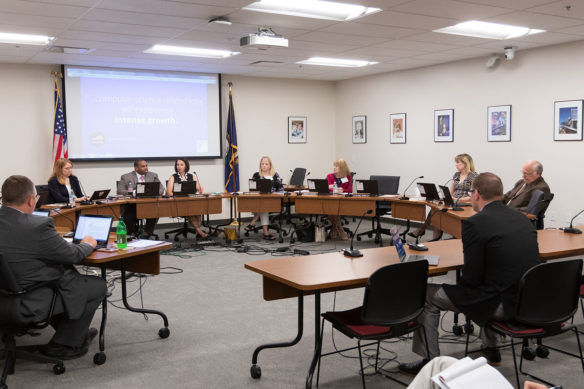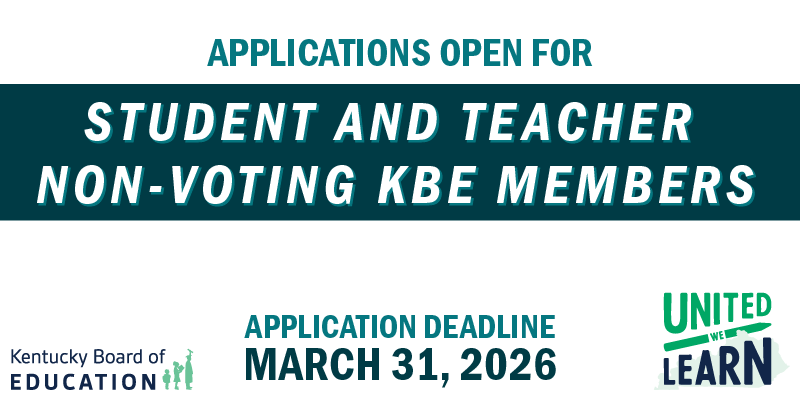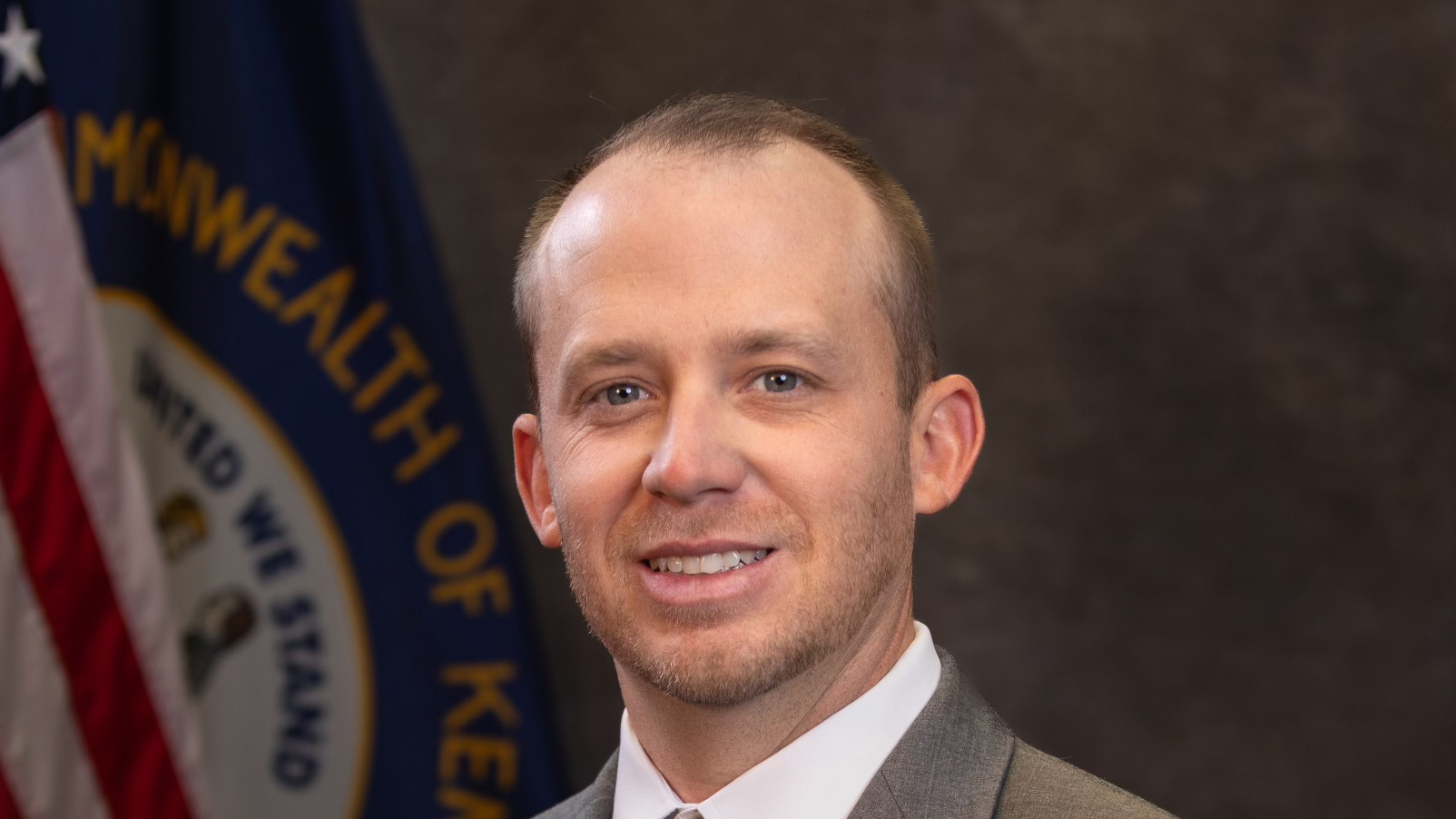
Members of the Education Professional Standards Board listen as Kentucky Education Commissioner Wayne Lewis, third from left, and Kentucky Department of Education Chief Digital Officer Marty Park, front right, discuss the need for more computer science teachers in Kentucky. Lewis told the board KDE will be working to combat teacher shortages in a number of areas.
Photo by Danielle Harris, June 17, 2019
- KDE will undertake a recruitment campaign that will focus in part on highlighting alternative routes to certification.
- Lewis asks the Education Professional Standards Board to help find ways to better prepare elementary school teachers to meet the content needs of students.
By Mike Marsee
mike.marsee@education.ky.gov
Kentucky Education Commissioner Wayne Lewis said raising awareness of teaching opportunities available to other professionals will be an important part of the work to combat “significant” teacher shortages in Kentucky.
At the June 17 meeting of the Education Professional Standards Board (EPSB), Lewis said during the Commissioner’s Report that the Kentucky Department of Education (KDE) will soon undertake a campaign to recruit teachers to the profession. One element of that campaign will focus on highlighting alternative routes to the classroom.
“Part of our campaign is going to have to center around greater awareness of professionals, folks who have started in other professions, about what the possibilities are for them to get into teaching,” Lewis said. “I find often in talking to people they’re not aware of all of the routes that are available, and lots of times folks think that the routes are much more onerous than they really are.”
Lewis said KDE and EPSB must work to address growing shortages.
“We’ve experienced shortages of teachers in critical shortage areas like career and technical education and special education for some time now, particularly in some regions of our state,” Lewis said. “What is happening now, which is different than we’ve experienced in years past, is we hear from superintendents who tell us they post elementary school teacher vacancies and get no applications.”
EPSB Board Chair Sarah Burnett, who is a 4th-grade math teacher in Pulaski County, applauded KDE’s efforts, saying that another important component of combating the teacher shortage is to encourage K-12 students to enter the teaching profession.
“It is our role as educators, when we see students who have potential to lead a classroom, to encourage them,” said Burnett. “Regardless of our political differences, our role as educators is to encourage, support and empower our students to grow up to have productive lives.”
Lewis said he wants to discuss with the board at future meetings what it can do to help better prepare elementary school teachers, whom he said must have increased expertise in several content areas to teach newly implemented and updated standards.
“You are asking teachers to have incredible expertise in teaching reading, English/language arts, mathematics, science, social studies and sometimes some elective areas. That’s a far greater ask in terms of breadth and depth than we have for teachers typically at the middle school and high school levels,” he said.
“We’re going to be asking you to think about approaches that we might be able to better prepare teachers to meet the content needs of kids without putting a greater burden on the teachers.”
Lewis said it’s important to do more than simply fill vacant positions, however.
“We have the challenge of needing to ensure that we have not just seats filled, but that we have high quality folks to deliver the type of instruction that we need,” he said.
Computer Science Teacher Shortage Addressed
One area in which more teachers will be needed is computer science. Academic standards for computer science in grades K-12 were recently adopted and implemented, and KDE Chief Digital Officer Marty Park said the next step is ensuring there are enough teachers to keep up with the demand for courses.
Kentucky is one of a handful of states that allows computer science courses to count toward graduation.
“Computer science in Kentucky, as in some other states, has the potential for rapid development,” Park said. “I would love to think about learning computer sciences, but also learning through computer sciences – things like computational thinking, critical thinking and creativity that can build into an area that we have recently redefined.”
Park said teachers currently are permitted to teach computer science through either traditional certification, occupation-based certification or manual clearances – earning permission, rather than a certification, to teach. He said KDE’s recommendation for filling the need center on:
- Expanding the opportunities for high-quality endorsements, perhaps through cohort models and peer coaching models;
- Re-examining lead content areas within the new definition of computer science; and
- Moving away from manual clearances to a formal, performance-based, incentivized model for computer sciences as a whole rather than individual courses.
Park noted there are currently about 2,570 open computing jobs in Kentucky.
“Do we want to fill those jobs with students from other states or do we want Kentucky kids there?” he said. “The jobs are there and they’re continuing to develop and increase.”
MORE INFO …



I was appalled when my daughter was told that she would need to take the PRAXIS CORE for admittance into her education program. She had a high ACT score and HS GPA, but evidently that is not enough anymore. Regardless that she graduated HS with honors, she still has to pay to be admitted. This is the type of ridiculousness that drives people away, redundancy! Teachers are tested to death, students are tested to death. Why not reserve that admittance test for those who don’t score well, if the EPSB insists on pushing more business PRAXIS’ way? Why not go with what all of the research tells us, that not everyone tests well? Of course she passes the test, however the money to pay for a test when we/she is already paying for college makes the test insulting. She is majoring in HS Biology, she has been told many times by professors that she will make more money in the medical field. I’m beginning to think it will cost more to go into education than it will to become the doctor she is well qualified to become. This Praxis Core needs to go!
They need to get rid of praxis I test that test doesn’t help us enter into classrooms. I know it’s had knob myself out of teaching for 10 years or longer. Colleges will not let you finished taking last classes until you finished this test. It needs go away I could had 10 years as business teacher have not been able to do this.
If you want expert educators for CS and other STEM subjects, why do you not make it easier for retired teachers to teach a few more years. Many in our county go to Tennessee and teach for 5-10 years because they are penalized receiving only 60-70 percent of their leaving salary and/or limited time allowed to teach per day. An experienced resource chased away.
… Additionally when I ask smart high school students about a career in education … not enough money (no COLA for years and an unsure retirement) and the toxic environment for educators in KY. I am old and have many intelligent students in AP classes … reluctance to be a teacher is a recent development.
You have got to be kidding?!!! I am a KY certified teacher and could not find a job last year or so far for this upcoming school year. I have 10 yrs of experience and have only been subbing for the past two years.
As a retired person from the school system it is ashame what we earn for all the years spent in education and college of 6+ years. Pay scales not fair while administrators get pay not even close to being equal to teacher pay for a job much more stressful and difficult. Teacher have no rights anymore. Parents are just waiting to file a lawsuit and students will tell u that. Too much time wasted on teacher paperwork and attending meetings not useful. Students are out of control and there is no support for teachers from anybody. That is the reason teachers will tell their own children to stay out of education. So much money wasted on testing. Assessment test another pressure on teachers to cheat or do whatever needed to for high scores. It is to the point just teach how to take the test, do not worry about what is really need for the child. I could go on and on with simple solutions but it is a waste of time. Too many people wanting to gain riches from some silly program, etc. they invented. A few years later somebody else wants to develop their crazy idea for riches.